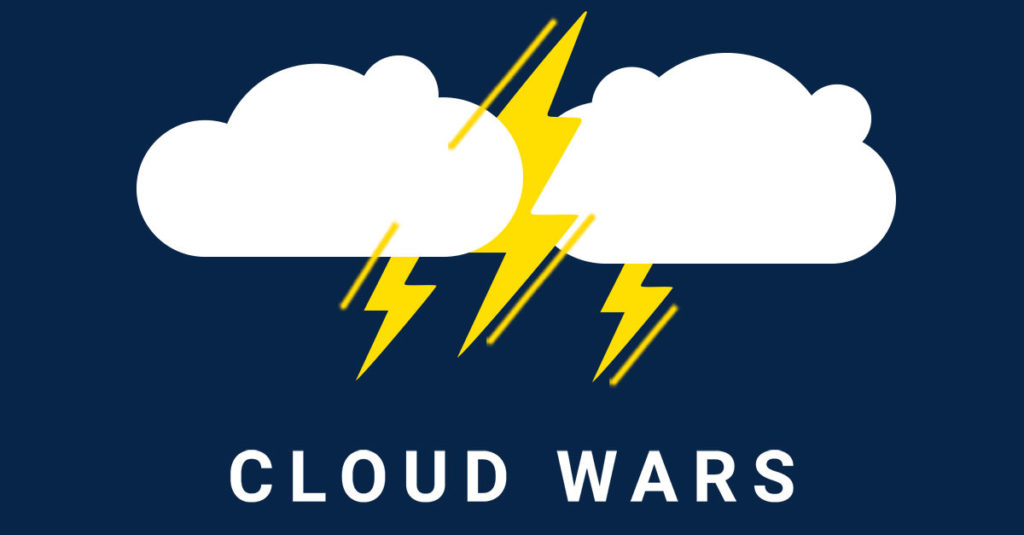Highlighting one of the greatest growth markets the tech business has ever seen, just a handful of the world’s leading cloud vendors are on pace to generate $100 billion in combined enterprise-cloud revenue this calendar year.
Extrapolating from recent financial results, growth rates, market momentum and particularly the insatiable appetite among business customers for cloud services, I’m estimating that Microsoft, Amazon, IBM, Salesforce, SAP, Oracle and Google will combine for at least $100 billion in enterprise-cloud revenue in calendar 2018.
The upshot is that not only is the cloud revolution in full swing, but it’s accelerating.
And it’s accelerating rapidly as businesses have realized the cloud accelerates innovation, enhances cybersecurity, and allows huge chunks of IT budgets to be redeployed from low-value work to high-value customer-facing initiatives.
And if we add into the mix 3 more enterprise-cloud powerhouses—ServiceNow, Workday and VMware—my projected revenue total for 2018 will easily surpass $100 billion and is likely to reach $110 billion.
So for business customers, their ability and eagerness to fully leverage the multiple financial, operational and technological benefits of the cloud is being met with more choices from more major tech vendors competing intensely for that business here in the midst of one of the greatest growth markets the tech space has ever seen.
And on the cloud-vendor side, the generational opportunity to rewire massive portions of the world’s IT environments and infrastructure has unleashed a torrent of high-octane animal spirits as the world’s leading tech companies, both young and old, are unleashing massive investments in R&D, newly configured global sales organizations, strategic partnerships, customer-success programs, ad campaigns and more in hopes of being top players in the cloud.
In fact, the three biggest enterprise-cloud vendors by revenue—#1 Microsoft, #2 Amazon and #3 IBM—stand a good chance of finishing calendar 2018 with combined enterprise-cloud revenue of $75 billion, according to my estimates.
If you’re looking at those rankings and scratching your head because you thought Amazon was the king of cloud revenue, that’s probably because some research firms and many people in the media business have spent the last couple of years peddling the complete falsehood that “the cloud” is synonymous with public-cloud IaaS.
In that portion of the cloud—just the IaaS layer for public cloud—Amazon is indeed the clear #1 and deserves great credit for creating and truly dominating the category.
But IaaS is only a slice of the enterprise cloud—and when you add in the other layers of PaaS and SaaS and arrive at total enterprise-cloud revenue rather than just a portion of it, Amazon is no longer the top player.
All-in on the enterprise cloud, the clear #1 player is Microsoft, which for the trailing 12 months ending March 31 posted revenue of $20.8 billion while Amazon’s total for the same 12-month period was $19.24 billion and IBM’s was $17.7 billion.
So as of today—141 days into 2018—here’s how I’m projecting these 10 major cloud vendors will finish 2018 ranked by enterprise-cloud revenue:
INTO THE STRATOSPHERE
*Estimated* 2018 Enterprise-Cloud Revenue for Top Vendors
Microsoft $28.3 Billion
Amazon $26.1 Billion
IBM $20.1 Billion
Salesforce $12.2 Billion
Oracle $6.4 Billion
SAP $5.9 Billion
Google $4.5 Billion
ServiceNow $2.8 Billion
Workday $2.7 Billion
VMware $2.0 Billion
Here are some key points for each of those top vendors as they battle it out over the next 224 days in the Cloud Wars:
Microsoft: In a recent conversation about the enterprise-cloud market, corporate VP Julia White reminded me, “Remember—if you think of the enterprise-cloud market as a bell curve, we’re only just beginning to approach the fat part.” As it eyes up that fat stuff, Microsoft’s commercial-cloud business is surging: it finished Q1 with revenue of $6 billion on a breathtaking growth rate of 58%.
Amazon: Its AWS unit had a fantastic Q1, posting revenue of $5.44 billionon a excellent growth rate of 49%. At least through Q1, Amazon’s defying gravity: as it gets bigger, its growth rate is rising. Amazon’s got more than 1 million enterprise-cloud customers and is trying to move more aggressively beyond its IaaS roots and into PaaS.
IBM: Without question the unexpected entrant into the elite tier of the enterprise cloud, IBM is creating a unique cloud business among its huge enterprise clients as it helps them convert legacy systems to private clouds and master the challenges of hybrid-cloud and multi-cloud environments.
Salesforce: On the huge strength of its market-leading SaaS business, CEO Marc Benioff notes that his company has $20 billion in cloud revenue on and off the balance sheet—up 40% from a year ago. Now, Salesforce is looking to complement its high-powered SaaS portfolio with an enhanced and expanded set of PaaS offerings.
SAP: This year, the longtime leader in on-premises enterprise applications says its cloud revenue will surpass its on-premises revenue. And CEO Bill McDermott plans to use that momentum to challenge Salesforce for leadership in CRM by offering insights into business-customer behavior from its ERP portfolio.
Oracle: With its SaaS business approaching $5 billion in revenue, Oracle has recently expanded its PaaS business by introducing the Oracle Autonomous Database and other autonomous PaaS services.
Google: In January, the enterprise-cloud iconoclast shed light for the very first time on revenue for its Google Cloud Platform, saying it exceeded $1 billion for the 3 months ending Dec. 31. But last month, in releasing companywide numbers for Q1, Google had nothing to say about GCP’s performance in the quarter ending March 31.
ServiceNow: With its own unique position in the market, plus a bone-deep commitment to customer success, plus ongoing 40% revenue growth and a market cap that’s now topping $30 billion, ServiceNow is punching above its weight in the Cloud Wars.
Workday: Another high-performance SaaS stalwart maintaining 40% growth as it’s surpassed $2 billion in annual revenue, Workday’s reporting strong uptake of its Financials product and its Prism Analytics, and is aggressively preparing the Workday PaaS platform for general availability.
VMware: Hard to know exactly how much of its revenue comes from the enterprise cloud, but VMware’s begun positioning itself as a heavyweight in hybrid cloud and multi-cloud.
So how about this for the Cloud Wars slogan for 2018: to $100 billion and beyond!
*******************
RECOMMENDED READING FROM CLOUD WARS:
The World’s Top 5 Cloud-Computing Suppliers: #1 Microsoft, #2 Amazon, #3 Salesforce, #4 SAP, #5 IBM
Amazon Versus Oracle: The Battle for Cloud Database Leadership
As Amazon Battles with Retailers, Microsoft Leads Them into the Cloud
Why Microsoft Is #1 in the Cloud: 10 Key Insights
SAP’s Stunning Transformation: Qualtrics Already “Crown Jewel of Company”
Watch Out, Microsoft and Amazon: Google Cloud CEO Thomas Kurian Plans To Be #1
The Coming Hybrid Wave: Where Do Microsoft, IBM and Amazon Stand? (Part 1 of 2)
Oracle, SAP and Workday Driving Red-Hot Cloud ERP Growth Into 2019
*********************
Subscribe to the Cloud Wars Newsletter for twice-monthly in-depth analysis of the major cloud vendors from the perspective of business customers. It’s free, it’s exclusive, and it’s great!








